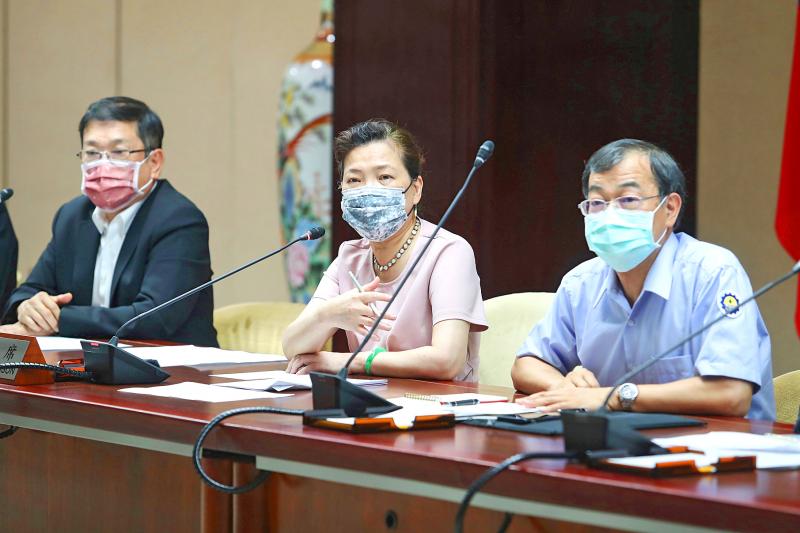Human error was to blame for blackouts across Taiwan on Thursday, Taiwan Power Co (Taipower, 台電) told a news conference yesterday, promising to compensate affected households and businesses.
Taipower vice president Wang Yao-ting (王耀庭) said that the households would be granted a 5 percent discount on their electricity bills for this month and next month, while 6,300 affected high-voltage business users would get a 5 percent discount for this month.
The compensations are expected to cost Taipower about NT$470 million (US$16.78 million), Wang said.

Photo: CNA
The company said that a Taipower employee caused the blackouts by mistakenly turning a switch at an ultra-high-voltage substation in Kaohsiung’s Lujhu District (路竹), leading to a voltage drop that forced the Hsinta Power Plant (興達電廠) to shut down as a protective measure.
About 4.15 million households across Taiwan lost power on a rotational basis, 50 minutes at a time, for about five hours, the utility said.
The Hsinta plant accounted for about 6 percent of Taiwan’s electricity production before it went temporarily offline on Thursday, Taipower said, adding that high temperatures, major generators undergoing maintenance, a water shortage and a lower-than-expected solar energy output also contributed to the incident.
Taipower and the Ministry of Economic Affairs were criticized for the scope of the incident, which came at a time when the system was supposed to have at least 10 percent excess capacity.
The company said that some of its designated reserve capacity was not “dispatchable.”
Asked why it had not activated a hydroelectric power plant at Nantou County’s Sun Moon Lake, Taipower said that Taiwan is in the middle of a historic water shortage.
“Technically, we could have run that plant, but then we would have lost a lot of water,” Taipower spokesman Chang Ting-shu (張廷抒) said.
While a hydroelectric power plant can be activated almost immediately, it takes 15 minutes to fire up a liquefied natural gas power plant and up to six hours for a coal-fired power plants, it said.
The blackouts occured in the afternoon, when solar power output is falling, Taipower said.
Minister of Economic Affairs Wang Mei-hua (王美花) said that Taipower should be “more conservative” in its calculations of reserve capacity, especially during the water shortage.
“We will take grid resilience seriously in the wake of this failure,” Wang said. “We also need more storage for electricity and to ensure our infrastructure projects are completed on schedule.”
A Bureau of Energy report earlier this week showed that Taiwan’s electricity use grew 2.1 percent last year, far above the 10-year average growth of 1.34 percent per year.
The bureau expects an annual average growth rate of 2.5 percent from 2025 to 2031.

INVESTIGATION: The case is the latest instance of a DPP figure being implicated in an espionage network accused of allegedly leaking information to Chinese intelligence Democratic Progressive Party (DPP) member Ho Jen-chieh (何仁傑) was detained and held incommunicado yesterday on suspicion of spying for China during his tenure as assistant to then-minister of foreign affairs Joseph Wu (吳釗燮). The Taipei District Prosecutors’ Office said Ho was implicated during its investigation into alleged spying activities by former Presidential Office consultant Wu Shang-yu (吳尚雨). Prosecutors said there is reason to believe Ho breached the National Security Act (國家安全法) by leaking classified Ministry of Foreign Affairs information to Chinese intelligence. Following interrogation, prosecutors petitioned the Taipei District Court to detain Ho, citing concerns over potential collusion or tampering of evidence. The

NEGOTIATIONS: Taiwan has good relations with Washington and the outlook for the negotiations looks promising, Minister of Economic Affairs J.W. Kuo said Taiwan’s GDP growth this year is expected to decrease by 0.43 to 1.61 percentage points due to the effects of US tariffs, National Development Council (NDC) Minister Paul Liu (劉鏡清) said at a meeting of the legislature’s Economics Committee in Taipei yesterday, citing a preliminary estimate by a private research institution. Taiwan’s economy would be significantly affected by the 32 percent “reciprocal” tariffs slapped by the US, which took effect yesterday, Liu said, adding that GDP growth could fall below 3 percent and potentially even dip below 2 percent to 1.53 percent this year. The council has commissioned another institution

NEGOTIATIONS: The US response to the countermeasures and plans Taiwan presented has been positive, including boosting procurement and investment, the president said Taiwan is included in the first group for trade negotiations with the US, President William Lai (賴清德) said yesterday, as he seeks to shield Taiwanese exporters from a 32 percent tariff. In Washington, US Trade Representative Jamieson Greer said in an interview on Fox News on Thursday that he would speak to his Taiwanese and Israeli counterparts yesterday about tariffs after holding a long discussion with the Vietnamese earlier. US President Donald Trump on Wednesday postponed punishing levies on multiple trade partners, including Taiwan, for three months after trillions of US dollars were wiped off global markets. He has maintained a 10 percent

TRADE: The premier pledged safeguards on ‘Made in Taiwan’ labeling, anti-dumping measures and stricter export controls to strengthen its position in trade talks Products labeled “made in Taiwan” must be genuinely made in Taiwan, Premier Cho Jung-tai (卓榮泰) said yesterday, vowing to enforce strict safeguards against “origin laundering” and initiate anti-dumping investigations to prevent China dumping its products in Taiwan. Cho made the remarks in a discussion session with representatives from industries in Kaohsiung. In response to the US government’s recent announcement of “reciprocal” tariffs on its trading partners, President William Lai (賴清德) and Cho last week began a series of consultations with industry leaders nationwide to gather feedback and address concerns. Taiwanese and US officials held a videoconference on Friday evening to discuss the